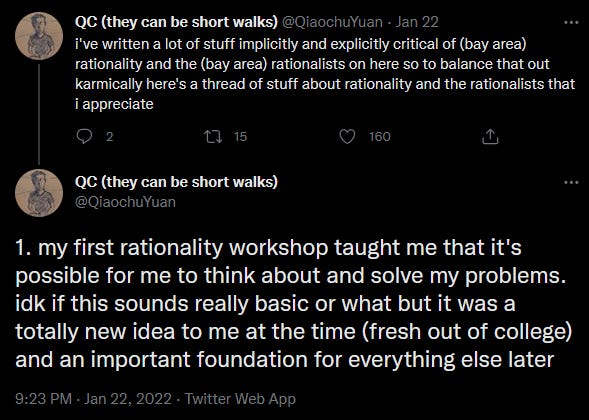Men Will Literally Have Completely Different Mental Processes Instead Of Going To Therapy
People are debating “therapy: good or bad?” again:
1,122Likes45Retweets](https://twitter.com/bastard_brian/status/1504969004024172546)
 Sasha Chapin @sashachapin@bastard_brian i can trace 90% of my current income and a fair amount of my current lifestyle competence to a couple of sessions with @SparksRemarks, and, as we know, performance coaches are actually just therapists12:14 AM ∙ Mar 19, 2022
Sasha Chapin @sashachapin@bastard_brian i can trace 90% of my current income and a fair amount of my current lifestyle competence to a couple of sessions with @SparksRemarks, and, as we know, performance coaches are actually just therapists12:14 AM ∙ Mar 19, 2022
 🎀 sonya supposedly 🤖 @sonyasupposedlytherapy is simply talking to a person, which is how it can be either insanely OP or completely ineffective or anything in between[1:02 AM ∙ Feb 15, 2022
🎀 sonya supposedly 🤖 @sonyasupposedlytherapy is simply talking to a person, which is how it can be either insanely OP or completely ineffective or anything in between[1:02 AM ∙ Feb 15, 2022
87Likes2Retweets](https://twitter.com/sonyasupposedly/status/1493390295223844864)
There are dozens of kinds of therapy: reliving your traumas, practicing mindfulness, analyzing dreams, uncovering your latent desire to have sex with your mother. But most people on both sides of this debate are talking about what psychiatrists call “supportive therapy” - unstructured talking about your feelings and what’s going on in your life.
I know the responsible thing to say is something like “this is helpful for some people but not others”. I will say that, in the end. But I have a lot of sympathy for the people debating it. I have such a strong intuition of “why would this possibly work?” that it’s always shocked me when other people say it does. And I know other people with such a strong intuition of “obviously this would work!” that it shocks them to hear other people even question it. Yet my patients seem to line up about half and half: some of them find therapy really great, others not helpful at all.
Whenever I try to understand this, I find myself coming back to this tweet:
Qiaochu is a smart person with various impressive academic accomplishments, all of which are . . . apparently compatible with being the person who would write this. And I hear weird stuff like this all the time. An equally accomplished friend told me at one point that “I was fifteen when it occurred to me for the first time that I had a personality”. I’ve previously written about a friend who was in their late teens/early twenties before they realized they could have food preferences.
I don’t want to exaggerate this. Regardless of what he says, I’m sure Qiaochu thought about and solved problems when he was in college - if nothing else, responding to problems like “it’s cold outside” with solutions like “maybe I should get a jacket”. But I trust him when he says he was lacking some kind of essential reflectivity or systematicity about it or something along those lines.
If you have no ability to systematically think about and solve your problems, you should probably tell all your problems immediately to someone who does, and maybe this person could be a therapist.
But also: people vary really widely in their ability to do something sort of like hold a conversation with themselves - for example, some people totally lack an inner monologue. Nobody has ever checked if those people benefit from therapy more, and I don’t want to actively predict that they would. But I know that I talk things over with myself a lot. Does this help me stay emotionally stable? Not sure; seems plausible. If I didn’t have an inner monologue, maybe the only way I could get that same effect would be by talking them over with another person.
Other people obsessively seek external reassurance. I talked here about the phenomenon of hypochondriacs who go to their doctor to be told that their latest concern (maybe the 25th time they had a certain symptom) isn’t worth worrying about, same as the last 24 times. They’re not even asking for an x-ray or something! They’re just happy to hear the doctor say the words “given that your last 24 symptoms were nothing, I’m assuming this one isn’t anything either”. Then they are delighted and go home! I sometimes think about this by analogy to “you can’t tickle yourself” - some people can’t reassure themselves either, and are very happy to hear thoughts they could have easily generated themselves coming from other people’s mouths. Are these some of the people who benefit from therapy? Seems plausible.
I worry this will come across as “everyone who benefits from therapy is defective in some sort of basic human functioning.” That’s not quite the message I want to send - partly because there are lots of other reasons therapy can benefit people, but partly because I suspect everyone is defective in some sort of basic human functioning, regardless of whether they like therapy or not.
Instead, think of it as: there’s wide variation in the details of people’s minds and thought processes - even smart competent people who you would really expect to have all the basic human skills. Probably some kinds of thought process make you more likely to benefit from supportive therapy, and others make you less likely. Nobody’s studied this and it’s all just speculation, but I think it’s reasonable speculation.
 brian @bastard_brianIt honestly boggles my mind that non rich people are willing to drop ~$100 on a single therapy session Just seems like such a bad ROI I feel bad for people culturally coerced into spending their money on this
brian @bastard_brianIt honestly boggles my mind that non rich people are willing to drop ~$100 on a single therapy session Just seems like such a bad ROI I feel bad for people culturally coerced into spending their money on this